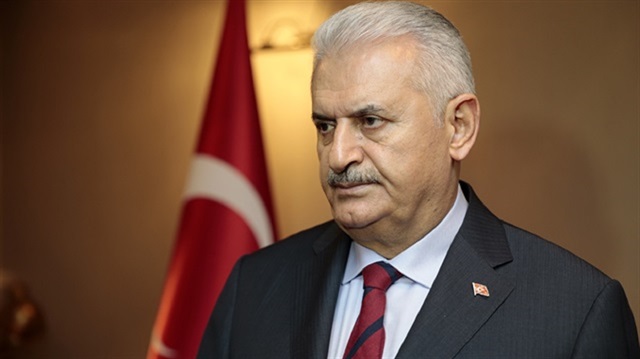
PM Yıldırım has said that Turkey will follow a similar strategy in Raqqa as it has in al-Bab and that Ankara and Washington are turning over a new leaf in terms of bilateral relations
Turkey and the United States have turned over a new leaf in bilateral relations, Prime Minister Binali Yıldırım said following a meeting with U.S. Vice President Mike Pence amid the 53rd International Munich Security Conference.
Yıldırım said on Saturday that Turkey and the U.S. are likely to cooperate on strategy against Daesh, particularly in Syria, noting that Turkey will follow a similar strategy in Raqqa as it has in al-Bab with Free Syrian Army (FSA) forces backed by the Turkish military.
Yıldırım also recalled Turkey's determinism against any role for the Kurdistan Workers' Party- (PKK) affiliated Democratic Union Party (PYD) and its People's Protection Units (YPG) militia in operations against the Daesh terrorist organization in Syria, adding it is not a proper strategy to use one terrorist organization against another.
"This operation should be conducted in a way that is appropriate with the strategic NATO alliance of Ankara and Washington," he said.
Yıldırım also expressed his objections to any proposal for a federated Syria that would include the PKK/PYD as a party.
“It is not possible for the PKK/PYD to attend any conference, as Turkey counts the PKK/PYD to be a terrorist organization. We cannot let the PKK/PYD take advantage of the chaos in Syria. The solution should be suitable to history and the customs of Syria," he said.
Yıldırım also recalled referenced President Recep Tayyip Erdoğan who said on Friday that Turkey's target after liberating al-Bab, Syria, from Daesh is the town of Manbij, and clearing the terrorist PKK/PYD from the region.
'Turkey has legitimate right to defend itself'
“Any model that is pushed from any outsider should be rejected. The right of Arabs, Kurds, Alawites, Yazidis and Turkmens should be taken into consideration," Yıldırım said.
“None of the solution proposals based on a sectarian is acceptable. Sectarian wars have killed millions of people in the past. We cannot let this happen again."
He also said that Turkish and Free Syrian Army (FSA) forces will continue sweeping from terrorist elements from al-Bab as part of Operation Euphrates Shield.
“Turkey is determined to continue putting its efforts against all terrorist organizations that are threats to Turkey. It doesn't matter if operations are being conducted in northern Iraq or Syria. Turkey has a legitimate right to defend itself from these threats," he said.
Yıldırım who also spoke on the Astana talks, the negotiations between the Syrian regime and opposition groups in the Kazakh capital Astana, as part of a Russian and Turkish aim to find common ground to stop the six-year-long bloodshed in war-torn Syria. He said the Astana talks aim to function as support for the Geneva talks.
"These efforts are not rivals, they are supposed to support peace together. One of them is not the substitute for the other," he said.
The talks, which focus on extending the cease-fire that came into effect on Dec. 30, 2016, have been brokered by Turkey, which backs the opposition, and Russia and Iran, which support Bashar Assad's regime.
Yıldırım also reiterated Ankara's determination to see the extradition of Fetullah Gülen, the leader of the Fetullah Terrorist Organization (FETÖ), from the U.S., adding that Gülen's extradition is among the top priorities waiting to be solved between the United States and Turkey. “We will handle the issue very seriously soon," he said.
Gülen's extradition process is an issue Ankara wants an immediate solution to, although Washington has claimed that it has not receive necessary documents, despite Turkish officials repeatedly emphasizing that they have sent all necessary documents.
Gülen, the FETÖ leader, masterminded the July 15 failed coup attempt, and Turkey has demanded that the U.S. extradite Gülen to face trial.
Washington says it is cooperating with Ankara on the matter and asked its NATO ally for patience as it processes the extradition request for Gülen to meet U.S. legal requirements.
When asked about the referendum on constitutional changes and a shift to a presidential system, Yıldırım expressed his pleasure over the Nationalist Movement Party's (MHP) support for the ruling Justice and Development (AK) Party, adding there is no obstacle for the main opposition Republican People's Party (CHP) to support to the referendum if it wants to.
“It is clear that the PKK, Daesh and FETÖ have expressed their objections to the referendum. Because they are aware of the fact that if a new constitution is expected they will be done," he said.
The system shift has been on the political agenda since Recep Tayyip Erdoğan, the former prime minister and AK Party chairman, was elected president in August 2014.
In Turkey, under the current parliamentary model, the people vote for the 550 members of Parliament.
A minimum number of 276 lawmakers can form the government. In the proposed presidential system, the electorate would vote for a person to form a government independently of Parliament and with no need of a vote of confidence.
Hello, the comments you share on our site are a valuable resource for other users. Please respect other users and different opinions. Do not use rude, offensive, derogatory, or discriminatory language.
The floor is all yours.












